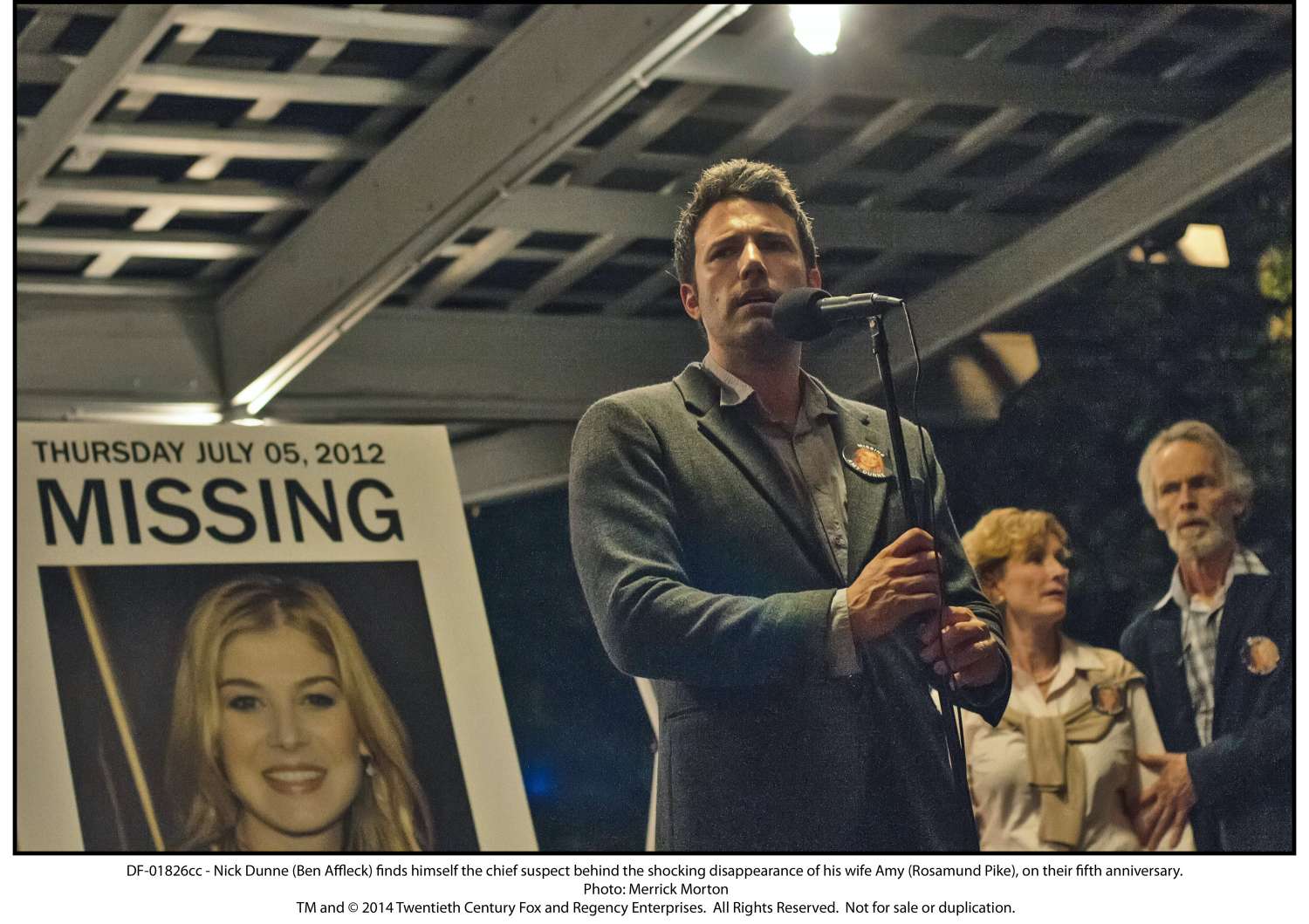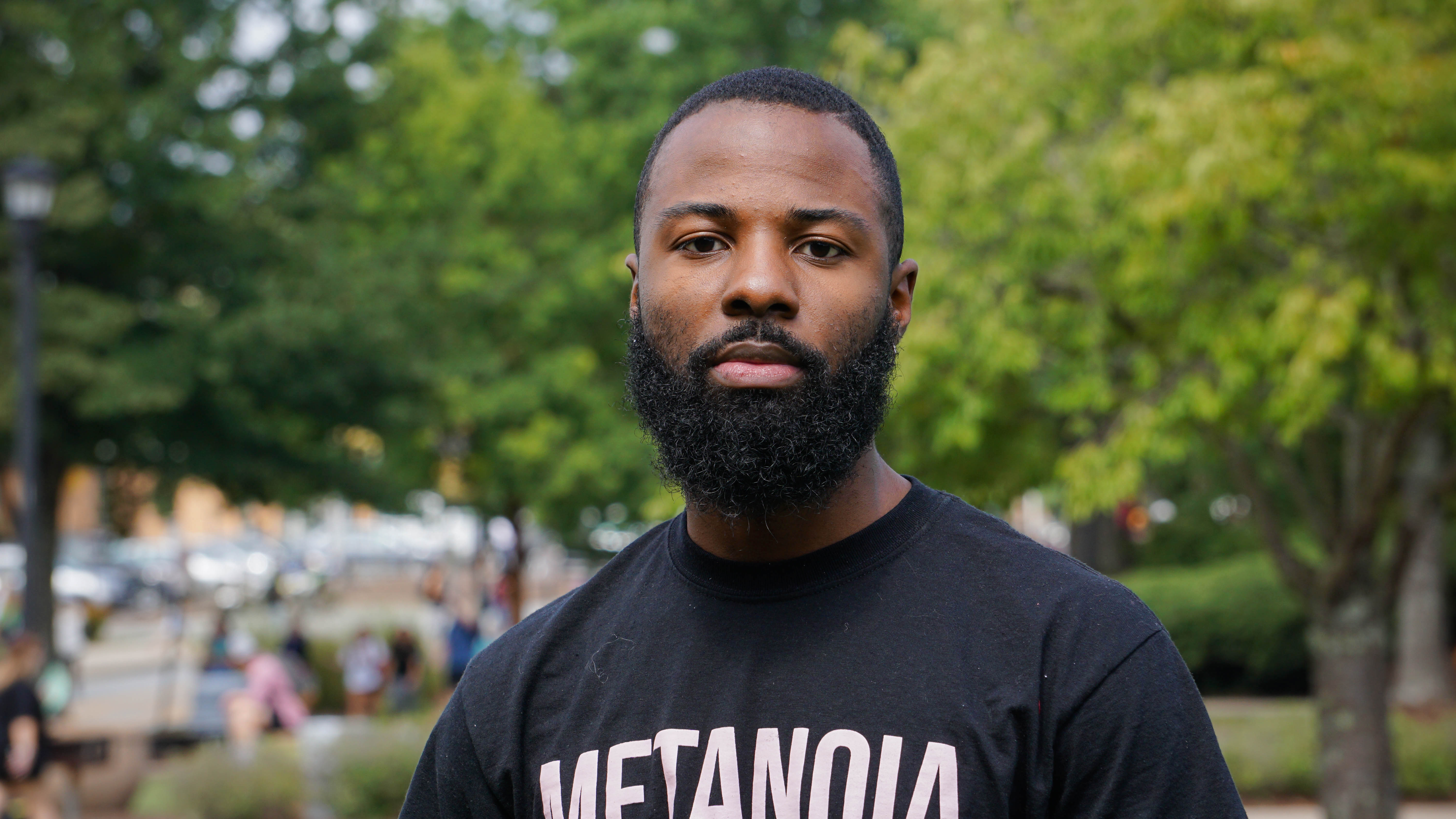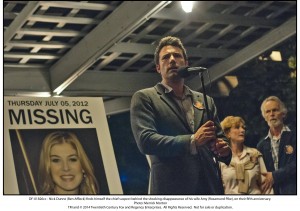 Movie Review
Movie Review
Mike Strong, Staff Writer
While “Gone Girl” is a brilliant adaptation of a story rife with shocks and twists, the ideas behind it go so much deeper than sheer shocking entertainment. At the core of Gone Girl’s story is a deep introspection into two key elements of life, romance and the public’s blind fascination with the media, both social and traditional. So much of what “Gone Girl” wants you to take away from it is dependent on experiencing what the story has to offer with a blank slate, so do not expect to find any spoilers here. This is simply an analysis of what makes the film adaptation of Gillian Flynn’s novel work so well emotionally, visually and critically.
The first half of “Gone Girl” tells two parallel stories that inform each other in every way possible. We get to see the initial courtship of Nick Dunne (Ben Affleck) and his future wife Amy (Rosamund Pike) as well as the story of her mysterious disappearance. By the time these expository stories run their course, “Gone Girl” sheds its skin and becomes a film with intelligent things to say about the deterioration of marriage. Through a dark and twisted tale, as expected from a Fincher directed thriller, the film explores the delusions that disillusioned lovers create to hold together a marriage that was founded on ideas of a perfect romance.
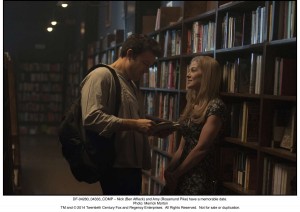 Throughout the few days following Amy’s disappearance, Amy narrates and guides the viewer through her thoughts in a series of flashbacks that span her introduction to Nick, all the way to the point in their marriage when she starts to feel like an object. In the present, we watch as Nick gets torn apart by the rest of the world, who puts him behind Amy’s disappearance, taking every chance to use Nick’s public actions as condemnations of murder. And the viewer cannot help but blame the accusers, as Amy’s recollections of their marriage go on to incriminate Nick more and more at every turn.
Throughout the few days following Amy’s disappearance, Amy narrates and guides the viewer through her thoughts in a series of flashbacks that span her introduction to Nick, all the way to the point in their marriage when she starts to feel like an object. In the present, we watch as Nick gets torn apart by the rest of the world, who puts him behind Amy’s disappearance, taking every chance to use Nick’s public actions as condemnations of murder. And the viewer cannot help but blame the accusers, as Amy’s recollections of their marriage go on to incriminate Nick more and more at every turn.
This was the primary portion of the story that pointed fingers at all forms of the media. From pictures posted on social media of Nick smiling ever so briefly next to Amy’s missing poster to a loudmouthed T.V. host who more than resembles Nancy Grace, Nick just cannot catch a break from the media. He is constantly hounded by reporters camped out in front of his home, some blatantly posting up on an innocent neighbor’s lawn. The bar that Nick owns even becomes a hot spot for teens to take selfies outside of, all due to Nick’s newfound criminalistic fame.
When the curtain is finally pulled back, and the true scope of “Gone Girl’s” gritty story reveals itself, the film becomes an 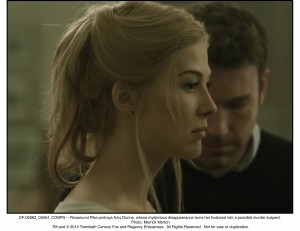 experience that sticks with you for days, in both good and bad ways. Once the movie told me, at least partially, what happened to Amy, I fully expected it to end there. The mystery in this murder mystery had been solved. I knew who was to blame, and how they did it. But in truth, the revelation was only the beginning. And that is not to say that the movie dragged on too long. On the contrary, it was one of the most engaging, gut-wrenching three hour experiences I have had in a theater. From beginning to end, the film is a faithful adaptation of the novel, but I would have welcomed even more story, despite such a satisfying ending. I was just so engaged in Nick and Amy’s journey as a couple.
experience that sticks with you for days, in both good and bad ways. Once the movie told me, at least partially, what happened to Amy, I fully expected it to end there. The mystery in this murder mystery had been solved. I knew who was to blame, and how they did it. But in truth, the revelation was only the beginning. And that is not to say that the movie dragged on too long. On the contrary, it was one of the most engaging, gut-wrenching three hour experiences I have had in a theater. From beginning to end, the film is a faithful adaptation of the novel, but I would have welcomed even more story, despite such a satisfying ending. I was just so engaged in Nick and Amy’s journey as a couple.
This is a David Fincher film through and through. It is not news that Fincher is attracted to adapting stories about twisted and broken people stuck in unsolvable situations. Like “Zodiac” and “The Girl with the Dragon Tattoo” before it, “Gone Girl” is as much about its caricatures of broken people as it is about solving a crime. Fincher’s typical visual style is at play here in a strong way. He manages to bring a level of nuance to the lighting of indoor environments that brings out tension while still encapsulating the subdued natures of the characters. His filmmaking style is a perfect fit for this story.
Fincher had a superb cast to boot. Affleck shines in his ability to make Nick both likeable for the viewers, detestable to the public criticizing him, and believable in his actions. Even though the film ends on such an unbelievable note, I fully believed Nick’s actions. I would have done everything Nick did. And Amy just would not have been the character she needed to be w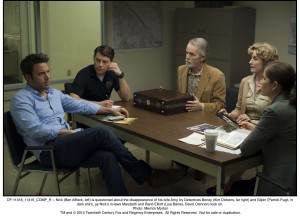 ithout Pike’s stellar portrayal of a character as extreme as Amy.
ithout Pike’s stellar portrayal of a character as extreme as Amy.
“Gone Girl” has a very strong chance at being one of the year’s best films. It is incredibly dark and occasionally gets quite graphic in its violence and sexuality, but as all gritty films do, it uses these uncomfortable events to further the story that needs to be told. The shock value is power here. And I have not seen as film as powerful as “Gone Girl” in a long time.

